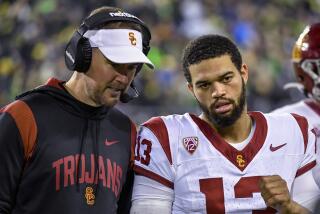Young NFL Coaches on Top--for Now
- Share via
MIAMI — Something was missing in the the NFL playoffs last season.
For the first time since 1963, they were contested without a team coached by Don Shula, Tom Landry, or Chuck Noll. Landry’s Dallas Cowboys and Noll’s Pittsburgh Steelers both suffered through losing seasons, while Shula’s Miami Dolphins finished with an 8-8 record.
Though they have eight Super Bowl titles and 693 victories among them, some critics wondered whether the absence of Noll, Shula and Landry from the playoffs was a sign that perhaps time had passed them by.
After all, there was a group of young coaches -- among them Bill Parcells of the New York Giants, Raymond Berry of the New England Patriots, Mike Ditka of the Chicago Bears, and Dan Reeves of Denver -- that were in the past two Super Bowls and seemed to have the best teams in the NFL.
“(Success) goes in cycles,” said Giants’ General Manager George Young, who worked with Shula in Baltimore and Miami. “It’s hard to keep your franchise up there. There are a lot of different things that determine your success, not just one guy. They (Shula, Landry, and Noll) are able to stay at the top.
“These other guys are newcomers. They’ve got a long way to go to catch that other group.”
For years, Shula, Landry, and Noll were recognized as the three best coaches in the game. In 1987, the top of the coaching echelon is not as clearly marked. Bill Walsh, Joe Gibbs, and Tom Flores have all won Super Bowls in the 1980s -- Flores and Walsh two each -- and Chuck Knox has .617 winning percentage after 14 seasons.
“When you talk about today, who’s a good coach now, there’s a hell of a lot of them,” said John Madden, who won the Super Bowl with the Raiders in 1977 and now is the No. 1 football color man for CBS.
“I think all coaches do a pretty good job today,” said Cowboys’ Vice President Gil Brandt. “I think the reason there’s a difference (in which coaches are perceived to be the best) is that you’ve been hearing about Don Shula for 25 years and only hearing about Bill Parcells for three or four years.”
Among the younger coaches, there appears to be no trend, no new technique that sets them apart from the older group. The qualities that made a good coach 30 years ago -- intelligence, hard work, and the ability to work under pressure -- are the same ones needed today.
“I think the best thing that describes all four (Reeves, Berry, Parcells, and Ditka) is that they’re all extremely intelligent,” Brandt said. “I think today if you work hard and you’re intelligent, then you have a chance to be successful. I think those are the most common characteristics to Don and Chuck and Tom and those four.”
“I think that people just copy,” Madden said. “I think that those guys like Shula, Landry and Noll have a lot of disciples out there. You bring up a Dan Reeves and a Mike Ditka, they’re both out of Tom Landry.”
In a sense, Noll is a Shula protege, coaching under Shula at Baltimore for three seasons.
Longevity is what sets Shula, Landry, and Noll apart. Landry is entering his 28th season with the Cowboys, Shula is entering his 25th year as a head coach, including seven with Baltimore, and Noll is in his 19th year with the Steelers.
Shula, who has a .707 winning percentage, is No. 2 on the career win list, three victories ahead of Landry. Noll is sixth on the list.
“When you get a guy that’s a 20-year guy, that in itself is an accomplishment,” Young said. “I don’t want to judge who’s better than whom and I could never put coaches in order. If you last more than 10 years it’s a milestone, 15 is another, and 20 is unbelievable. In order to last that long, you have to have success. You can’t fake it.”
Learning to adjust and abandon outdated methods that were once successful also is important.
“I think the reason Don and Chuck and Tom are successful is that they can change,” Brandt said. “Because Don Shula was in the Super Bowl three years ago, that doesn’t mean that they’re not going to change the way they do things. What (Landry) has changed is that he’s been able to change from the 60s to the 70s to the 80s.
“He never says we did it this way last year, or did it this way in 1978 when we won the championship. He’s been able to change and not live in the past.”
More to Read
Go beyond the scoreboard
Get the latest on L.A.'s teams in the daily Sports Report newsletter.
You may occasionally receive promotional content from the Los Angeles Times.










